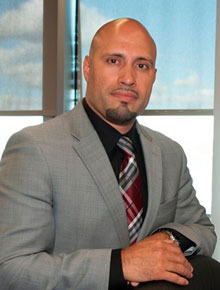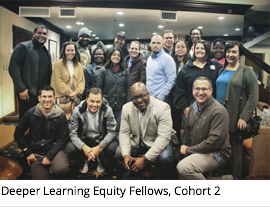MENTORING MATTERS: Newburgh Superintendent Fights to Bring Equity and Deeper Learning into Classrooms—With Help from Mentors, Coaches and Others
January 17, 2017
The Newburgh City School District has a new champion for equity: Dr. Roberto Padilla. The superintendent, who started in this position only two years ago, has an ambitious plan to tackle Newburgh's educational opportunity gap, a problem he considers to be one of his district's biggest challenges.

Located 60 miles north of New York City, Padilla's school district is nestled in an urban-suburban city that struggles with high poverty rates and scarce resources for its public schools. The district has cut $56 million in funding over the last six years.
As a result, the district struggles to provide students with the same high-quality educational opportunities available in districts with more resources.
This needs to change, Padilla points out. But, he isn't doing it alone.
Padilla is a Deeper Learning Equity Fellow (Equity Fellow), a program run by Big Picture Learning in partnership with Internationals Network for Public Schools. He hopes to learn from the ample opportunities the fellowship offers for guidance from experienced mentors, coaches and other fellows of the program.
As part of the 24-month leadership program, Padilla will design and implement a capstone project that addresses gaps in his school district. His project will focus on removing barriers that prevent the equitable access to and successful implementation of deeper learning instruction in classrooms.
An evidence-based practice, deeper learning instruction prepares students for college and career by integrating the mastery of academic content with the development of key competencies, such as critical thinking, problem solving, collaboration and effective communication, in real-world contexts. Often, especially in low-income school districts such as Padilla's, using deeper learning instructional methods isn't prioritized.
Coaches and Community of Learners
Padilla is part of the fellowship's second cohort. Since his first day as an Equity Fellow in July 2016, he has worked with his coach, Carlos Moreno, to develop his capstone project. Moreno and other coaches help fellows to clarify their project proposals and guide them to the knowledge they will need to do their work. Playing an integral role, they provide one-on-one coaching sessions, hold monthly online office hours and are a source of ongoing support.
 "He makes himself very available. If I have a challenge, I can call him or text him all the time," Padilla says about Moreno.
"He makes himself very available. If I have a challenge, I can call him or text him all the time," Padilla says about Moreno.
Moreno, co-executive director of Big Picture Learning, co-founded the fellowship with Claire Sylvan, founder and senior strategic adviser at the Internationals Network for Public Schools. Sylvan is also a coach for the fellowship.
Each coach works with four to five fellows, who together make up a "pod." The pods meet virtually once every six weeks to discuss their projects, share ideas with each other and troubleshoot any challenges. Coaches and individual pod members alternate as facilitators.
The program's leadership created this structure because it provides a "collaborative working structure" for fellows, says Sylvan. "The set up allows them to learn from each other."
Four in-person convenings over the course of the fellowship also provide an opportunity for fellows to share their knowledge, work with each other and meet with their coaches in person.
"The value I get is knowing that I can network and build a relationship with other fellows," Padilla says.
Mentors Provide Advice on Project
Once Padilla completes the early development stages of his capstone project, he will be paired with a mentor who is "well-positioned to provide advice" on the implementation of the project "based on his or her area of expertise and the project's particular focus," says Moreno.
While both coaches and mentors provide valuable support and guidance, the major distinction between them is that, "coaches start working with fellows much earlier to help them form a clear capstone project," says Sylvan. "Mentors come on board once the project is formed."
Mentors are available by phone and video-chat check-ins. While not required, they are invited to the convenings and many do attend to support their mentees.
Padilla doesn't know who his mentor is yet, but he is optimistic and excited to begin this working relationship soon.
"One of the things that made this fellowship really attractive is the list of who the mentors are," Padilla says. "I wanted to learn from the movers and shakers in the field."
The fellowship has an outstanding bench of mentors who are experienced educators and professors at universities, researchers at think tanks, C-level executives at education reform organizations and many other distinguished professionals in the education industry.
Whoever his mentor is, Padilla says, he is looking for a "thought partner—someone he can bounce ideas off of."
Big Picture Learning's Deeper Learning Equity Fellowship Program is a grantee partner of ECMC Foundation. In 2015, we made investments that support the program's expansion and second cohort of Equity Fellows.
